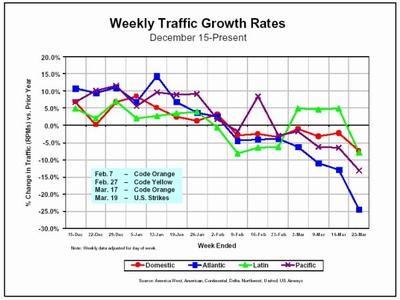 Emphasizing support for the President and the
national resolve of the nation to free Iraq, the Air Transport
Association (ATA) reported that the war effort is taking a heavy
toll on demand for air travel. Systemwide drops in traffic -- from
already depressed pre-war levels —- have forced carriers to
make additional capacity cuts and eliminate more than 10,000 jobs
in the first week of the war.
Emphasizing support for the President and the
national resolve of the nation to free Iraq, the Air Transport
Association (ATA) reported that the war effort is taking a heavy
toll on demand for air travel. Systemwide drops in traffic -- from
already depressed pre-war levels —- have forced carriers to
make additional capacity cuts and eliminate more than 10,000 jobs
in the first week of the war.
"As we outlined just a few weeks ago, the airline
industry is in a seriously weakened state and now is beginning to
buckle from the non-market blow being dealt by the war," said ATA
President and CEO James C. May. "The airlines have been making the
tough decisions necessary to cut costs, to cope with existing
market conditions. But the war in Iraq, combined with domestic
terrorism threats that keep the nation at Code Orange high alert,
are non-market forces putting extraordinary negative pressure on
demand."

In the week preceding the war, traffic moderated slightly.
Following the March 16 Azores Summit, however, demand dropped at a
pace not seen since the aftermath of the September 11 attacks.
Traffic for the week ended March 23 fell 10 percent, led by a 25
percent drop in the Atlantic, a 13 percent drop in the Pacific, and
an 8 percent drop in Latin markets. Domestic traffic also fell 7
percent.
Advance bookings for the next 60 to 90 days suggest no relief in
sight. Domestic bookings are down more than 20 percent, Atlantic
down more than 40 percent, Latin off more than 15 percent and
Pacific more than 30 percent. Airlines have reported that on some
days cancellations are exceeding bookings.
Two weeks ago, ATA in its report, Airlines in Crisis: the Perfect Economic
Storm, outlined the impacts a war would have on the airline
industry, projecting traffic would drop 15 percent during the
quarter in which fighting occurs. Data collected thus far are
consistent with those projections.

"If this were a hurricane, the federal government would have
declared a state of emergency and called out FEMA," May added.
"This war is an extraordinary, non-market condition that has
combined with the airlines' already weakened state to truly result
in the perfect economic storm. Regrettably, our predictions of
massive job losses and revenue are proving to be all too
accurate."
 ATA has projected in its report that the war would
trigger a total of 70,000 layoffs and the elimination of 2,200
daily flights in 2003. Just since the war began, carriers have
announced additional systemwide capacity cuts of 6 to 12 percent
and job cuts in excess of 10,000. In addition, Hawaiian Airlines
declared bankruptcy since the war began, brining the total number
of airlines under Chapter 11 bankruptcy protection to three. This
week’s job cuts, flight reductions and additional
bankruptcies also are in line with the ATA report.
ATA has projected in its report that the war would
trigger a total of 70,000 layoffs and the elimination of 2,200
daily flights in 2003. Just since the war began, carriers have
announced additional systemwide capacity cuts of 6 to 12 percent
and job cuts in excess of 10,000. In addition, Hawaiian Airlines
declared bankruptcy since the war began, brining the total number
of airlines under Chapter 11 bankruptcy protection to three. This
week’s job cuts, flight reductions and additional
bankruptcies also are in line with the ATA report.
"It is imperative that Congress offer specific relief for the
economic consequences of the war. The airlines are not seeking a
bailout or protection from normal market forces. On the contrary,
we are seeking mitigation of the damage being done by the
non-market impacts from the war."
The Air Transport Association of America's members transport 95
percent of all the passenger and cargo traffic in the United
States.
 Aero-News: Quote of the Day (12.09.25)
Aero-News: Quote of the Day (12.09.25) ANN's Daily Aero-Term (12.09.25): High Speed Taxiway
ANN's Daily Aero-Term (12.09.25): High Speed Taxiway ANN's Daily Aero-Linx (12.09.25)
ANN's Daily Aero-Linx (12.09.25) NTSB Final Report: Diamond Aircraft Ind Inc DA20C1 (A1); Robinson Helicopter R44
NTSB Final Report: Diamond Aircraft Ind Inc DA20C1 (A1); Robinson Helicopter R44 ANN FAQ: Q&A 101
ANN FAQ: Q&A 101






